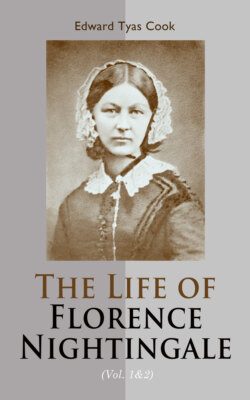Читать книгу The Life of Florence Nightingale (Vol. 1&2) - Edward Tyas Cook - Страница 64
На сайте Литреса книга снята с продажи.
II
ОглавлениеFrom the moment when public announcement of her mission was made, she had, indeed, become a popular heroine. Though well known in Society, she had been as yet a stranger to public fame; so much so that the Times itself, in printing the announcement (Oct. 19), said: “We are authorised to state that Mrs. Nightingale,” etc. Delane cannot have kept his eye on the news-columns, for not until some days had elapsed was it discovered to the public that “Mrs.” Nightingale was in fact “Miss.” “Who is ‘Mrs.’ Nightingale?” was a heading in the Examiner (Oct. 28), and the question was answered in a biographical article. Some passages of it deserve record here, for it went the round of the press throughout the world, and was the source from which, from that day to this, the popular idea of Florence Nightingale has been derived. The article stated succinctly, and with substantial accuracy, the course of her life; dwelt upon the facts that she was “young, graceful, feminine, rich, and popular”; enlarged, with less accuracy, upon her delight in the “palpable and heart-felt attractions” of her home; described her forsaking the “assemblies, lectures, concerts, exhibitions, and all the entertainments for taste and intellect with which London in its season abounds,” in order to sit beside the sick and dying; and concluded thus: She had set out for the scene of war
… at the risk of her own life, at the pang of separation from all her friends and family, and at the certainty of encountering hardship, dangers, toils, and the constantly renewing scene of human suffering, amid all the worst horrors of war. There are few who would not recoil from such realities, but Miss Nightingale shrank not, and at once accepted the request that was made her to form and control the entire nursing establishment for all sick and wounded soldiers and sailors in the Levant. While we write, this deliberate, sensitive, and highly-endowed young lady is already at her post, rendering the holiest of women's charities to the sick, the dying, and the convalescent. There is a heroism in dashing up the heights of Alma in defiance of death and all mortal opposition, and let all praise and honour be, as they are, bestowed upon it; but there is a quiet forecasting heroism and largeness of heart in this lady's resolute accumulation of the powers of consolation, and her devoted application of them, which rank as high and are at least as pure. A sage few will no doubt condemn, sneer at, or pity an enthusiasm which to them seems eccentric, or at best misplaced; but to the true heart of the country it will speak home, and be there felt that there is not one of England's proudest and purest daughters who at this moment stands on so high a pinnacle as Florence Nightingale.
The discovery by the public that the head of the Nursing Expedition was not “Mrs.” Nightingale, a matron, but a young lady, “graceful, rich, and popular,” added to the enthusiasm which her devotion called forth. Her services were rendered gratuitously; her necessary expenses were to be defrayed by the Government, and officialdom opined that no voluntary contributions, either in money or in kind, were needed. Happily for the comfort of our soldiers in the East, private individuals took a different view, and—in addition to the Times Fund—donations were sent to Miss Nightingale personally, both by her friends and by the general public. An account rendered after her return78 from the East shows that from the general public she received nearly £7000 in money. This fund, added to the help which she obtained from the Times, and supplemented by expenditure out of her private purse, enabled Miss Nightingale greatly to extend the scope of her work. The statement that she was rich requires some qualification. Her father was rich, but the personal allowance which he had made to her, when she declared her independence in 1853, was £500 a year, and it remained at this figure for several years. During her mission to the East she devoted the whole of it to her work.
Gifts in kind and offers of personal service also poured in. Now that Miss Nightingale was at sea, the task of dealing with such matters was undertaken by her sister and a friend. The Nightingale family had taken a house for the time in Cavendish Square (No. 4), which became the headquarters of a charitable bureau.
“I am well nigh writ out,” wrote Lady Verney to Madame Mohl (Nov. 6), “170 letters to answer in the last fortnight, and very difficult ones, some of them. I should like you to hear a batch of the offers of all kinds we receive, some so pretty, some so queer. Old linen is abating, I am happy to say; even knitted socks are slacker; but nurses, rabble and respectable, ladies, and very much the reverse, continue to rain. It is tremendous; however, having reached No. 276, we are going to shut the door. Mary Stanley and I sit daily at the receipt of custom, and funny things do we see and hear! Human nature is a wondrous work, whether of God Almighty I sometimes begin to doubt.”
It is worth noting, in view of an unfortunate dispute that presently arose, that both Lady Verney and Miss Stanley distinctly understood that additional nurses would only be sent “if Flo asks.” All applicants were so informed; but so keen was the desire to serve, that “many ladies,” so Lady Verney wrote, “are undergoing hospital training on chance.”
